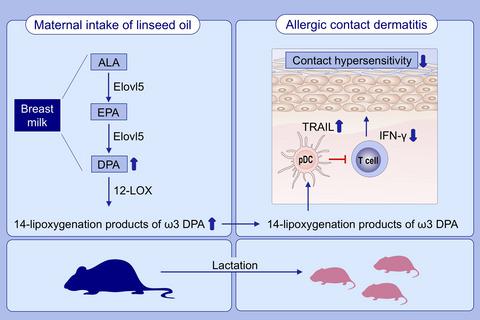Our official English website, www.x-mol.net, welcomes your
feedback! (Note: you will need to create a separate account there.)
Maternal ω3 docosapentaenoic acid inhibits infant allergic dermatitis through TRAIL‐expressing plasmacytoid dendritic cells in mice
Allergy ( IF 12.6 ) Pub Date : 2020-03-04 , DOI: 10.1111/all.14217 So-Ichiro Hirata 1, 2 , Takahiro Nagatake 1 , Kento Sawane 1, 3, 4 , Koji Hosomi 1 , Tetsuya Honda 5 , Sachiko Ono 5 , Noriko Shibuya 6 , Emiko Saito 7 , Jun Adachi 8 , Yuichi Abe 8 , Junko Isoyama 8 , Hidehiko Suzuki 1 , Ayu Matsunaga 1 , Takeshi Tomonaga 8 , Hiroshi Kiyono 9, 10, 11, 12 , Kenji Kabashima 5 , Makoto Arita 13, 14, 15 , Jun Kunisawa 1, 2, 4, 9, 16
Allergy ( IF 12.6 ) Pub Date : 2020-03-04 , DOI: 10.1111/all.14217 So-Ichiro Hirata 1, 2 , Takahiro Nagatake 1 , Kento Sawane 1, 3, 4 , Koji Hosomi 1 , Tetsuya Honda 5 , Sachiko Ono 5 , Noriko Shibuya 6 , Emiko Saito 7 , Jun Adachi 8 , Yuichi Abe 8 , Junko Isoyama 8 , Hidehiko Suzuki 1 , Ayu Matsunaga 1 , Takeshi Tomonaga 8 , Hiroshi Kiyono 9, 10, 11, 12 , Kenji Kabashima 5 , Makoto Arita 13, 14, 15 , Jun Kunisawa 1, 2, 4, 9, 16
Affiliation

|
Maternal dietary exposures are considered to influence the development of infant allergies through changes in the composition of breast milk. Cohort studies have shown that ω3 polyunsaturated fatty acids (PUFAs) in breast milk may have a beneficial effect on the preventing of allergies in infants; however, the underlying mechanisms remain to be investigated. We investigated how the maternal intake of dietary ω3 PUFAs affects fatty acid profiles in the breast milk and their pups and reduced the incidence of allergic diseases in the pups.
中文翻译:

母体ω3二十二碳五烯酸通过表达TRAIL的小鼠浆细胞样树突细胞抑制婴儿过敏性皮炎
母亲的饮食暴露被认为会通过改变母乳成分来影响婴儿过敏的发展。队列研究表明,母乳中的 ω3 多不饱和脂肪酸 (PUFA) 可能对预防婴儿过敏有益;然而,潜在的机制仍有待研究。我们调查了母体饮食中 ω3 多不饱和脂肪酸的摄入量如何影响母乳及其幼崽中的脂肪酸谱,并降低幼崽过敏性疾病的发生率。
更新日期:2020-03-04
中文翻译:

母体ω3二十二碳五烯酸通过表达TRAIL的小鼠浆细胞样树突细胞抑制婴儿过敏性皮炎
母亲的饮食暴露被认为会通过改变母乳成分来影响婴儿过敏的发展。队列研究表明,母乳中的 ω3 多不饱和脂肪酸 (PUFA) 可能对预防婴儿过敏有益;然而,潜在的机制仍有待研究。我们调查了母体饮食中 ω3 多不饱和脂肪酸的摄入量如何影响母乳及其幼崽中的脂肪酸谱,并降低幼崽过敏性疾病的发生率。











































 京公网安备 11010802027423号
京公网安备 11010802027423号